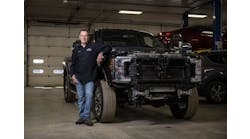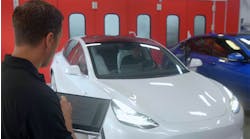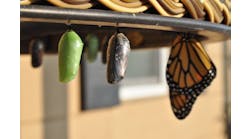These days, Greg Slack takes joy in doing as many as 20 local sales calls per week, delivering oatmeal raisin or sugar cookies to businesses in towns like Livingston, Wis., to ensure that his collision repair business stays at the top of potential clients’ minds.
Nine years ago, though, Slack derived little pleasure from his daily tasks as the majority owner of Collision Specialists, a two-location MSO. The business that his father, Jack Slack, founded in 1967 in rural Wisconsin was in a decade-long rut. Revenue levels had remained static for years, while the cost of doing business only increased, a story Greg Slack shared with FenderBender back in 2013.
Slack briefly thought about selling the business, for pennies on the dollar, to a minority partner. The only thing stopping him was family pride.
“Back then, it was definitely stressful,” Slack recalls. “At the time, we had three kids, and I had a newborn. It was hard to go to work and do the same thing over and over each day.”
Fortunately for Slack, in 2011 he began receiving consultation, and the advice he received from longtime collision repairers helped revitalize the MSO. Slack, who boosted Collision Specialists’ CSI score to 98 percent by 2017, breaks down the steps that shop owners can take to set their business up for longterm success.
Increase community involvement.
Seeking to fortify the foundation of his customer base, Slack began increasing his partnerships with local school districts back in 2013. After all, schools tend to serve as a community rallying point in rural communities like those in southwestern Wisconsin.
“Each year,” Slack explains, “I do a back-to-school fundraiser, where we donate money in August and September. For those two months, I donate money back to the school of the customer’s choosing.”
Collision Specialists also occasionally hosts charitable carwash events to aid youth organizations.
“We actually detail vehicles the entire day,” Slack says. “We schedule about 40 cars—vacuum the inside, wipe down the dash, and we clean all the glass. The Leo Club, they run three different shifts of kids, and we have several stations, where [for example], one person’s job is to run a vacuum, and that’s all they do. They make about $1,500 for that one-day event.”
Incentivize employees.
In Slack’s experience, if employees don’t have a carrot dangled in front of them, work can become boring and monotonous. But, if a staff feels as though it’s largely in control of its earning potential, it can make a significant difference.
That’s why, at Collision Specialists’ shops, technicians are paid at an hourly rate plus a production bonus for all of their billed hours. Estimators also receive monthly bonuses for work that flows through the shop.
“Even my secretary has a bonus plan for how much money’s collected by the shop,” Slack says. “It gives her an incentive to keep hounding whoever owes us money.
“If your employees don’t have something to achieve in front of them, then it’s just another job.”
Make local sales calls.
For each Collision Specialists location—both in Livingston, Wis., and in Fennimore, Wis.—Slack makes sure that staff members make at least 10 weekly sales visits. Staff members canvas an area that stretches roughly 20 miles from either shop, armed with cookies from a local bakery.
The sales calls largely serve as an introduction to potential customers and help future clients associate a friendly face with Collision Specialists.
“If you’re at a local business, we’ve probably stopped there,” Slack says with a laugh. “When we walk in the door, people smile; they know they’re going to get some good cookies.”
Save for rainy days.
In 2012, on the advice of trainers, Slack began taking 5 percent of each week’s gross income and saving it in a separate bank account, in case his business ever endures another rough stretch.
“Leave that money alone and don’t touch it,” Slack suggests. “Then, have your main checking account to run your bills and payroll. If that checking account starts to shrink, then it puts urgency on you and your staff to build that checkbook up.
“It just makes you focus on collecting money and retaining money.”



